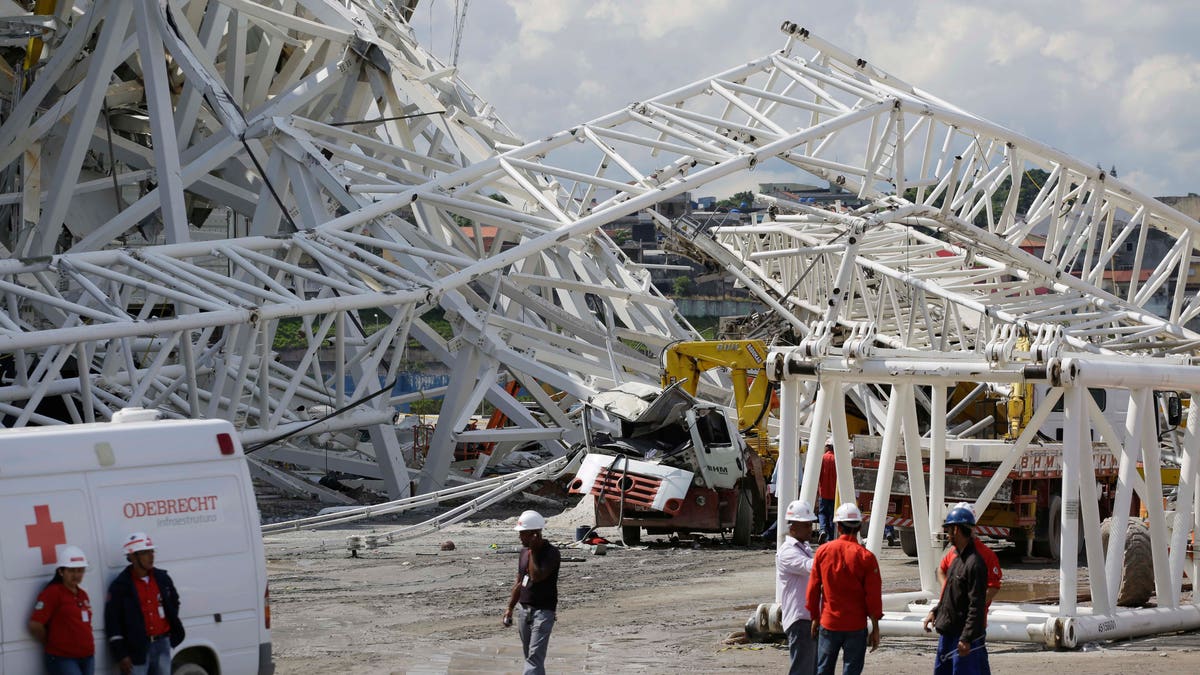
Nov. 27, 2013: People stand near a metal structure that buckled on part of the Itaquerao Stadium in Sao Paulo, Brazil. (AP)
SAO PAULO – World soccer governing body FIFA said Thursday it is trying to find out the extent of the damage caused by the collapse at the stadium hosting the 2014 World Cup opener and until then it won't be able to assess how much the accident will delay the venue's delivery.
Two workers were killed when a crane crashed into a 500-ton metal structure that toppled over part of the stadium in Sao Paulo on Wednesday, aggravating already urgent worries that Brazil won't be ready for soccer's showcase event next year.
FIFA wanted all 12 World Cup stadiums ready by the end of December but it will likely have to accept the Sao Paulo venue after its original deadline. The governing body has said it has no Plan B for the host cities because nearly 1 million tickets have already been sold for the matches.
"It is too premature to make any detailed assessment on the situation of the Corinthians Arena as we are still awaiting the technical report to be able to evaluate the scale of the damage," FIFA said in a statement sent to The Associated Press. "We will be able to provide an update earliest next week following the FIFA Organizing Committee of the FIFA World Cup."
Next week FIFA and the top names in soccer will be in the resort city of Costa do Sauipe for the high-profile draw that will determine the World Cup schedule.
Work at the Corinthians Arena was advanced but all activities have been halted at least until Monday. Workers were given a three-day mourning period and those who went to the stadium on Thursday were turned back.
Former Corinthians President Andres Sanchez said Wednesday that the accident didn't cause any major structural damage, but added that getting the stadium delivered on time was the least of the club's concern.
"I don't want to know about FIFA right now; we are worried about the families of the victims," he said.
FIFA released a statement on Wednesday saying that "the safety of workers is the top priority" for football's governing body.
Engineers and technicians are conducting inspection visits at the venue to try to determine when it will be possible to reopen the construction site.
Public prosecutors and workers unions also were on the site to make sure conditions are safe. One of the workers killed Wednesday was taking a break in an area that was supposed to be clear, according to Corinthians club officials.
Ricardo Trade, CEO of the local World Cup organizing committee, said only local authorities would determine if there is a need to suspend construction, but he didn't "believe this is going to cause delays" with the World Cup opener nearly seven months away on June 12.
World Cup preparations have been plagued by setbacks including cost overruns, stadium delays, accidents, labor strife and huge street protests in the run-up to the June tournament, once envisioned as a coming-out party for South America's largest nation, which is also scheduled to host the 2016 Olympics in Rio de Janeiro.
The stadium was nearly finished before Wednesday's accident. The metal structure that collapsed cut through the stadium's outer walls, destroying part of the outside of the building and slamming into a giant LED panel that runs across the facade.
The newspaper Estado de S. Paulo said public prosecutors had previously pointed to 50 irregularities at the venue, including some related to emergency drills.
It wasn't the first problem with World Cup stadiums in Brazil. Three workers have died in accidents at three construction sites over the past two years, and one stadium had work halted for nearly a week this year because of safety concerns.
The web portal R7 reported Thursday that 23 construction workers were killed in on-site accidents and another 132 were injured over the past five years in the city of Sao Paulo alone. The report said it had compiled statistics from the municipal health ministry.








































